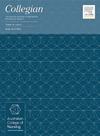绘制家庭护理在国家层面的本科教育:一项横断面研究
IF 1.7
4区 医学
Q2 NURSING
引用次数: 0
摘要
家庭是关心和支持的重要单位,由相互依赖的个体通过生理、情感或社会纽带联系在一起形成。它的动态既塑造又由成员的健康塑造,使其成为护理不可或缺的一部分。护理教育应促进护士对家庭参与护理的积极态度。了解家庭问题在本科护理课程中是如何被重视的,这是将家庭视为护理单位的基础。目的识别和描述全国本科护理教育中家庭护理知识的整合情况。DesignCross-sectional研究。参与者:18个本科护理专业。方法第一阶段-全国本科护理专业调查(2020年5月- 6月)。第二阶段:家庭课程内容分析(2020年6月- 2021年1月)。结果共有256个护理专业符合纳入标准,每个专业4 ~ 35个课程。确定了七个类别。其中四个是基于理论基础先验定义的:家庭理论方法、个人和家庭健康经验、家庭护理技能和家庭护理方法。其余三个类别从数据分析中出现后验:教育背景,家庭护理过程,伦理和道义问题。结论本科护理专业开设家庭课程,且以临床教学为主。课程中描述的最常见的家庭方法是将家庭作为背景。调查结果还指出,需要关注家庭护理的不同方法,包括“家庭作为客户”、“家庭作为一个系统”和“家庭作为社会的一个组成部分”,强调了家庭护理的多维性。护理教育应强调探索新策略的重要性,以教授家庭护理,从家庭作为背景的角度前进到家庭作为护理客户的角度。影响通过以家庭为中心的方法加强本科护理教育的学习过程需要对现有课程计划和强调临床实践的教学策略的整合有深刻的理解。通过关注以家庭和病人为中心的护理,本研究旨在影响教育政策的发展和完善,这些政策支持综合方法来教授护理和更广泛的护理概念,强调以家庭为中心的观点。无患者贡献。使用公共数据,结果可以影响教育政策,并将对未来护理本科学生产生影响。本文章由计算机程序翻译,如有差异,请以英文原文为准。
Mapping family nursing in undergraduate education at a national level: A cross-sectional study
Background
Family is a vital unit of care and support, formed by interdependent individuals linked through biology, emotions, or social bonds. Its dynamics both shape and are shaped by members’ health, making it integral to nursing care. Nursing education should promote a positive attitude among nurses regarding the involvement of families in care. Knowing how family issues are valued in undergraduate nursing programmes is fundamental to consider family as a unit of care.
Objectives
The aim is to identify and describe the integration of family nursing knowledge within undergraduate nursing education nationally.
Design
Cross-sectional study.
Participants
Eighteen undergraduate nursing programs.
Methods
Phase I – National survey of undergraduate nursing programs (May–June 2020). Phase II – Content analysis of courses with a family approach (June 2020–January 2021).
Results
The nursing programs revealed 256 courses that fulfilled the inclusion criteria, ranging from four to thirty-five courses per program. Seven categories were identified. Four of these were defined a priori, based on theoretical foundations: Theoretical Approach of Family, Individual and Family Health Experience, Skills for Family Care, and Approaches to Family Nursing. The remaining three categories emerged a posteriori from data analysis: Education Context, Nursing Process of Family, and Ethical and Deontological Issues.
Conclusion
Family is taught in undergraduate nursing programs, mainly in clinical settings. The most frequent family approach depicted in the curriculum was family as context. The findings also point to a focus on different approaches to family nursing, including ‘family as a client’, ‘family as a system’, and ‘family as a component of society’, underlining the multidimensional nature of family nursing. Nursing education should emphasise the importance of exploring new strategies to teach family care, moving forward from a perspective of the family as a context to a perspective of the family as a client of care.
Impact
Enhancing the learning process in undergraduate nursing education through a family-centred approach requires a deep understanding of existing Curricular Plans and the integration of pedagogical strategies that emphasise clinical practice. By focusing on both family and patient-centred care, this research aims to influence the development and refinement of educational policies that support comprehensive approaches to teaching both nursing care and the broader concept of care, emphasising a family-centred perspective.
No Patient Contribution. Public data were used and results can influence the education policies and will have an impact in future undergraduate nursing students.
求助全文
通过发布文献求助,成功后即可免费获取论文全文。
去求助
来源期刊

Collegian
NURSING-
CiteScore
2.70
自引率
6.70%
发文量
127
审稿时长
72 days
期刊介绍:
Collegian: The Australian Journal of Nursing Practice, Scholarship and Research is the official journal of Australian College of Nursing (ACN).
The journal aims to reflect the broad interests of nurses and the nursing profession, and to challenge nurses on emerging areas of interest. It publishes research articles and scholarly discussion of nursing practice, policy and professional issues.
Papers published in the journal are peer reviewed by a double blind process using reviewers who meet high standards of academic and clinical expertise. Invited papers that contribute to nursing knowledge and debate are published at the discretion of the Editor.
The journal, online only from 2016, is available to members of ACN and also by separate subscription.
ACN believes that each and every nurse in Australia should have the opportunity to grow their career through quality education, and further our profession through representation. ACN is the voice of influence, providing the nursing expertise and experience required when government and key stakeholders are deciding the future of health.
 求助内容:
求助内容: 应助结果提醒方式:
应助结果提醒方式:


